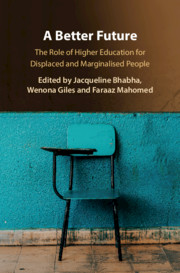Book contents
- A Better Future
- A Better Future
- Copyright page
- Contents
- Figures
- Tables
- Notes on Contributors
- Introduction
- Part I Encountering Marginalisation
- Part II Deconstructing Marginalisation
- Chapter 8 Providing Access to Higher Education for Refugees in Europe
- Chapter 9 The German Case
- Chapter 10 Colombian Distress Migrants in Ecuador
- Chapter 11 Transcending Socio-cultural Barriers
- Chapter 12 Combating the Exclusion and Marginalisation of Persons with Intellectual Disabilities in Higher Education in the United States
- Chapter 13 ‘Invisible’ Disabilities in South Africa’s Higher Education Sector
- Part III Confronting Marginalisation
- Index
- References
Chapter 11 - Transcending Socio-cultural Barriers
Access to Tertiary Education of Muslim Minority Youth in Greece
from Part II - Deconstructing Marginalisation
Published online by Cambridge University Press: 06 September 2020
- A Better Future
- A Better Future
- Copyright page
- Contents
- Figures
- Tables
- Notes on Contributors
- Introduction
- Part I Encountering Marginalisation
- Part II Deconstructing Marginalisation
- Chapter 8 Providing Access to Higher Education for Refugees in Europe
- Chapter 9 The German Case
- Chapter 10 Colombian Distress Migrants in Ecuador
- Chapter 11 Transcending Socio-cultural Barriers
- Chapter 12 Combating the Exclusion and Marginalisation of Persons with Intellectual Disabilities in Higher Education in the United States
- Chapter 13 ‘Invisible’ Disabilities in South Africa’s Higher Education Sector
- Part III Confronting Marginalisation
- Index
- References
Summary
Muslim minority youths in Greece were up to twenty years ago de facto excluded from tertiary education owing to a nexus of historical and political reasons. In 1996 an important affirmative action measure was taken as regards admission policy aiming at compensating for the years-long exclusion. This chapter is based on the testimonies of forty-four minority youths who made use of this affirmative measure and concerns their educational trajectories and their experiences as students. Their stories are framed within the educational system addressing minority learners, the existing socio-cultural context and the debate on affirmative action. The youths express a desire to break away from the constraints of minority life while they acknowledge that affirmative action provides a redress for social injustice and cannot alone provide an opportunity for upward mobility for all. Student life represents a huge social leap that demands the transcendence of multiple social and cultural barriers related to discrimination, geographical seclusion and past isolation. The student narratives oscillate between fear of distancing themselves from the familiarity of their community, but also a desire to break away from tradition and family constraints and make a life of their own.
- Type
- Chapter
- Information
- A Better FutureThe Role of Higher Education for Displaced and Marginalised People, pp. 245 - 267Publisher: Cambridge University PressPrint publication year: 2020

